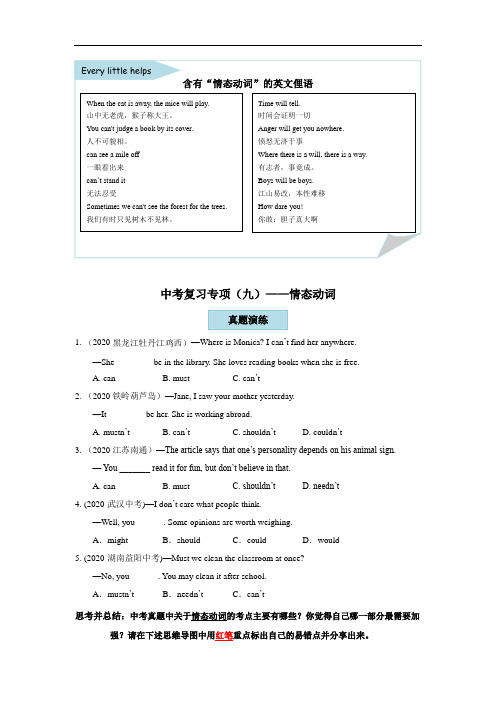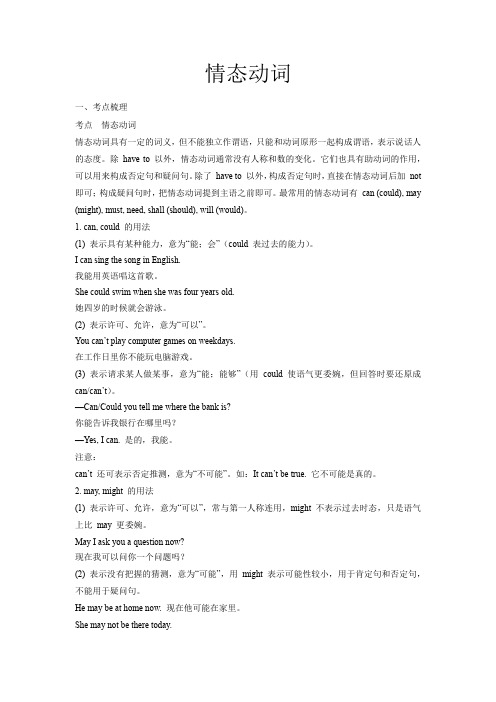中考专题复习之情态动词
中考英语专项提分复习专项 (九)—情态动词

中考复习专项(九)——情态动词1.(2020黑龙江牡丹江鸡西)—Where is Monica? I can’t find her anywhere.—She ________ be in the library. She loves reading books when she is free.A. canB. mustC. can’t2.(2020铁岭葫芦岛)—Jane, I saw your mother yesterday.—It ________ be her. She is working abroad.A. mustn’tB. can’tC. shouldn’tD. couldn’t3.(2020江苏南通)—The article says that one’s personality depends on his animal sign.—You _______ read it for fun, but don’t believe in that.A. canB. mustC. shouldn’tD. needn’t4.(2020·武汉中考)—I don’t care what people think.—Well, you ______. Some opinions are worth weighing.A.might B.should C.could D.would5.(2020·湖南益阳中考)—Must we clean the classroom at once?—No, you ______. You may clean it after school.A.mustn’t B.needn’t C.can’t思考并总结:中考真题中关于情态动词的考点主要有哪些?你觉得自己哪一部分最需要加强?请在下述思维导图中用红笔重点标出自己的易错点并分享出来。
知识思维导图考点专练➢考点1:情态动词本意6.(2020·江苏连云港中考)If we don’t protect nature, some wildlife ______ die out in the future.A.need B.may C.can’t D.shouldn’t7.(2020攀枝花)—China is going to use AI to protect the Great Wall.—Great! AI is so helpful that people _____________use it in their daily life now.A. mustB. canC. shallD. have to8.(2020·湖北部分市中考)Oh! Mum, where’s my notebook? I ______ find it.A.can’t B.needn’t C.shouldn’t D.mustn’t9.(2020·江苏淮安中考)You ______ smoke here! Look at the sign. It says “No smoking”.A.needn’t B.mustn’t C.can D.may10.(2020·江苏徐州中考)Mother had a hard time getting Helen up in the morning. She called and called, but Helen ______ wake up.A.wouldn’t B.mustn’t C.needn’t D.shouldn’t11.(2020·辽宁营口中考)—Where are my keys? I’m afraid I lost them again.—Don’t worry! With the new lock, you ______ search for them any more.A.shouldn’t B.can’t C.mustn’t D.needn’t12.—Mun, can I do the homework tomorrow?—You finish it today.A.had betterB. have betterC. had better notD. had rather not13.—The room is do dirty. we clean it?—OK.A.WillB. ShallC. WouldD. Do14.There’s only one day to go. You finish your schoolwork by tomorrow.A.canB. willC. mustD. mayst year I drive. I used to take the bus.A.couldB. couldn’tC. shouldD. shouldn’t➢考点2:情态动词引导的一般疑问句16.(2020广西柳州)—Must I finish my homework now, Dad?—Yes, you ______.A. mayB. needC. must17.(2020·四川乐山中考)—______ we leave the library before 5 o’clock?—No, you needn’t. You can stay here until 5:30.A.Must B.May C.Can18.—Can we walk across the road now ?—No, we . We have to wait until the light turns green.A.couldn’tB. needn’tC. shouldn’tD. mustn’t➢考点3:情态动词表推测19.(2020·天津中考)I ______ be late, so don’t wait for me to start the meeting.A.mustn’t B.needn’t C.need D.may20.(2020·泰州中考)—In China,many students feel stressed because of too much homework. —Don’t worry. Our government has realized this problem. I’m sure there ______ be good news for them soon.A.can B.must C.should D.need21.(2020·江苏无锡中考)You ______ be able to control all the things that happen to you, but you can decide not to be reduced by them.A.need not B.may not C.must not D.should not22.(2020青海)—Lily is intelligent and hard-working, she ________ do well in the singing competition.—Sure. She was born to be a singer.A. shouldB. mightC. can’t23.(2020·辽宁抚顺本溪辽阳中考)I walked here today, so this bike ______ be mine.A.can B.mustn’t C.can’t D.must➢易混易错24.—Are you going to the cinema tonight?—I don’t know. I go or I stay at home.A.will; will B.must; must C.should; should D.might; might 25.—May I watch TV, Dad?—When your homework is finished, you .A.should B.can C.must D.need26.We pay to get into the concert. It’s free.A.can’t B.mustn’t C.might not D.don’t have to27.(2020·湖北咸宁中考)—Mum, it’s too hot. ______ I swim in the lake with my friends?—No, you______. That’s too dangerous!A.Could;mustn’t B.Need;couldn’tC.Must;needn’t D.Should;can’t28.—What it be?—It be a mail box, for it is moving. It be a car.A.can; can’t; mustB. can; can; mustC. can; mustn’t; mustD. must; mustn’t; can29.—Look, someone is coming. Guess .—Jack. He’s always on time.A.who can it beB. who he mayC. who he can beD. who it can be30.—May I use your camera this Sunday?—No, you .A.needn’t B.may not C.won’t D.mustn’t 31.—Would you like to go boating with us?—Yes, .A.I’d like B.I want C.I’d like to D.I do32.You to the meeting this afternoon if you have something important to do.A.needn’t to comeB. don’t need comeC. don’t need comingD. needn’t come33.—I take the newspaper away?—No, you mustn’t. You read it only here.A.Must; can B.May; can C.Need; must D.Must; must34.—Please don’t be late again. —Oh, sorry. I _______.A.can’tB. willC. mayD. won’t35.you continue in your efforts and achieve new and greater successes!A.MayB. CanC. HopeD. Will36.—I want to know if I smoke here.—No, you . Could you see the sign “NO SMOKING” on the wall?A.can; needn’tB. must; can’tC. shall; won’tD. can; mustn’t37.—Could I borrow your ruler?—Yes, of course you .A.willB. canC. couldD. may38.—Who is singing in the next room?—It be Lisa, but I’m not sure.A. mayB. mustC. needD. would39. I missed the last bus, so I go home on foot.A. mustB. have toC. mayD. had to40. (2020·苏州中考)—Mum, why do I have to wash hands so many times a day?—For your health, you ______ be too careful.A .can ’tB .shouldn ’tC .mustn ’tD .needn ’t根据文章大意,从方框中选择合适的词填入空中,注意选词的形式变换。
最新版-英语情态动词专项复习

we can see his name on it .
7
4. need (需要) 既可做实义动词也可做情态动词 1)实义动词 need to do sth 需要做某事
Eg: I need to buy a big house . --- Do you need to buy a big house ? --- Yes , I do . No, I don’t . He needs to borrow a map . --- Does he need to borrow a map ?
Yes ,you may. No, you mustn’t. No, you can’t.
Yes, you must. No, you needn’t. No you don’t have to
Yes, you must. No, you needn’t
1.Must I take the keyboard to the office now ?
2) 情态动词 need do sth 需要做某事 Eg: I need buy a big house .
8
5. have to
不得不
Eg: It’s eleven o’clock . I have to go now .
He has to finish the work first .
请注意: I don’t have to go now .
--No, you __C___.Tomorrow is Saturday .You
may get up later.
A mustn’t
2023中考英语重难点专练 专题09 情态动词(原卷版)

2023中考英语重难点专练专题09 情态动词1.can/could用法考点1.1.表示能力,意为“能,会”。
could是can的过去式,表示过去的能力。
辨析:can和be able to的区别1.2.表示推测,意为“可能”,常用于否定句和疑问句中。
could既可以表示过去的可能性,又可以表示现在的可能性,其语气更弱一些。
例句This can't be the right road.不可能是这条路。
1.3.表示请求或允许,常用于“Can/Could l/you...?”句型中。
could不表示过去,而是表示委婉的请求,但答语只能用can.例-Could you help me work out the problem?你能帮我做出这道题吗?-Yes,I can.是的,可以。
2.may/might用法考点2.1.may/might表示把握性不大的推测,意为“或许,可能”,可以对现在、过去或将来的情况进行推测,常用于肯定句中。
might表示的可能性低于may.例I might be a few minutes late.我可能会晚到几分钟。
2.2.may/might表示请求许可或征求对方的意见。
给予许可时可用may,但不能用might.例-May/Might I come in?我可以进来吗?-Yes,you may.是的,你可以。
不能用might3.must的用法考点3.1.must 表示义务,意为“必须”,强调说话人的主观意志。
例You must work hard.你必须努力工作。
辨析:must和have to的区别You have to wear sports shoes when you climb a mountain.爬山的时候你必须穿运动鞋。
3.2.must表示推测时,指有根据、有把握的推测,只能用于肯定句。
可以对现在、过去或将来的情况进行推测。
例You must be a middle school student.你一定是一名中学生。
中考英语情态动词用法总结

中考英语情态动词用法总结情态动词是英语中一种特殊的动词形式,用来表示说话人的情态和态度,以及表示可能性、能力、推测、请求、命令等。
以下是中考英语常见的情态动词及其用法总结:1. can/could-表示能力或允许做事- 例如:I can swim.(我会游泳。
)- 例如:Could I borrow your pen?(我可以借用你的钢笔吗?)2. may/might-表示可能性、许可或请求允许- 例如:It may rain tomorrow.(明天可能会下雨。
)- 例如:May I use the restroom?(我可以去洗手间吗?)3. must-表示必须或肯定性- 例如:You must finish your homework before going out.(你必须先做完作业才能出去。
)- 例如:He must be tired.(他一定很累。
)4. should-表示建议、义务或期望- 例如:You should eat more fruits and vegetables.(你应该多吃水果和蔬菜。
)- 例如:You should apologize for what you said.(你应该为你说的话道歉。
)5. would-表示愿意、习惯或请求礼貌- 例如:Would you like some tea?(你想要些茶吗?)- 例如:He would always help others.(他总是愿意帮助别人。
)6. will/would-表示将来时态或意愿- 例如:I will visit my grandparents next weekend.(下个周末我将去看望我的爷爷奶奶。
)- 例如:Would you like to join us for dinner?(你愿意和我们一起吃晚饭吗?)需要注意的是,情态动词本身不变化,没有人称和数的变化。
它们后面接原形动词,表示动作或状态。
情态动词(17张PPT)初中英语专项复习课件

表示需要、必须,主 要用于否定句和疑问 句中。needn’t常用 于回答must表请求的 否定回答
—Must I finish my homework now?我必 须现在完成我的家庭作 业吗? —No, you needn’t. 不, 你不需要。
注意 (1) must和have/has to均意为“必须”,常可互 换使用。但have/has to是用于强调客观需要,意为 “必须, 不得不”;must用于表示主观看法, 意为“ 必须, 应该”。如:We’ll have to ask Zhang Hong. 我们必须去问张红了。 We must work hard at school. 在学校我们必须 努力学习。
情态动词本身有一定的意义,但不能独立作谓语, 没有人称和数的变化,后面必须接动词原形。常见的情 态动词有:may, must, need, have to 等,具体用法见下表 :
情态动词
用法
例句
表示能力,意为 Sam can speak English well.
can “能,会”
山姆英语讲得很好。
He could have gone home. 他可能已回家了。
【中考英语总复习 精讲精练】8 情态动词(原卷版)

情态动词一、考点梳理考点情态动词情态动词具有一定的词义,但不能独立作谓语,只能和动词原形一起构成谓语,表示说话人的态度。
除have to 以外,情态动词通常没有人称和数的变化。
它们也具有助动词的作用,可以用来构成否定句和疑问句。
除了have to 以外,构成否定句时,直接在情态动词后加not 即可;构成疑问句时,把情态动词提到主语之前即可。
最常用的情态动词有can (could), may (might), must, need, shall (should), will (would)。
1. can, could 的用法(1) 表示具有某种能力,意为“能;会”(could 表过去的能力)。
I can sing the song in English.我能用英语唱这首歌。
She could swim when she was four years old.她四岁的时候就会游泳。
(2) 表示许可、允许,意为“可以”。
You can’t play computer games on weekdays.在工作日里你不能玩电脑游戏。
(3) 表示请求某人做某事,意为“能;能够”(用could 使语气更委婉,但回答时要还原成can/can’t)。
—Can/Could you tell me where the bank is?你能告诉我银行在哪里吗?—Yes, I can. 是的,我能。
注意:can’t 还可表示否定推测,意为“不可能”。
如:It can’t be true. 它不可能是真的。
2. may, might 的用法(1) 表示许可、允许,意为“可以”,常与第一人称连用,might不表示过去时态,只是语气上比may 更委婉。
May I ask you a question now?现在我可以问你一个问题吗?(2) 表示没有把握的猜测,意为“可能”,用might 表示可能性较小,用于肯定句和否定句,不能用于疑问句。
中考英语情态动词考点总结与归纳
中考英语情态动词考点 - 总结与归纳一、情态动词的定义情态动词是指一类常用于英语中表示某种程度或表达说话者态度的动词。
这类动词一般与其他动词连用,构成一种新的动词形式。
情态动词在语言学中属于一种独立的语法类别,通常不能被变位或时态等语法标记所改变。
常见的情态动词有 can, could, may, might, must, shall, should, will, would, ought to 等等。
二、情态动词的用法1.表示能力或可能性Can 表示一种能力或可能性,通常表示能力和肯定的意思,例如:-I can swim. (我会游泳。
)-He can speak Chinese. (他会说中文。
)Could 和 can 的用法基本相同,但 could 表示能力或可能性的含义较弱,或用于委婉地表达请求或建议,例如:-I could come to your party if I have time. (如果有时间的话,我可以来参加你的派对。
)-Could you please pass me the salt? (请你把盐递给我好吗?)May 和 might 表示可能性,通常表示可能但不一定发生的情况,例如:-It may rain tomorrow. (明天可能下雨。
)-The train might be late. (火车可能会晚点。
)2.表示推测或假设May, Might 和 could 也可以用于表示推测或假设,例如:-She might be at home. (她可能在家。
)-I may have left my keys at work. (我可能在办公室把钥匙忘了。
)-Could you be more specific about what you want? (你能不能更具体地说一下你想要的是什么?)3.表示劝告或命令Should 和 ought to 可以用于表示劝告或命令,后者更强调应该做的事情,例如:-You should take the medicine three times a day. (你应该每天服药三次。
【中考英语复习 知识清单】专题10-情态动词(解析版)
专题10-情态动词2023年中考英语知识清单(通用版)目录考情分析: (1)1. 情态动词can 和could的主要用法 (1)2. 情态动词may和might 的主要用法 (2)3. 情态动词must 的主要用法 (3)4. 情态动词need 的主要用法 (4)5. 情态动词shall 的主要用法 (4)6. 情态动词should 的主要用法 (5)7. 情态动词ought to 的主要用法 (5)8. 情态动词will 的主要用法 (6)9. 情态动词would 的主要用法 (6)10 . 含有情态动词的被动语态构成形式及其基本用法 (6)11. 牛刀小试 (7)考情分析:中考英语试题对情态动词的考查主要是:一般疑问句的问与答,理解情态动词表示猜测的用法及情态动词的被动语态应用。
情态动词表示说话人对某一动作或状态的态度,认为“可能”,“应该”或“必要”等。
情态动词本身词义不完全,不能独立作谓语动词,必须和动词原形连用(ought除外)。
情态动词没有人称和单复数的变化。
常用情态动词有can(could), may(might), must, ought to, have to, need, dare, shall(should), will(would)。
1. 情态动词can 和could的主要用法(1)表示能力,意为“能,会”。
如:Can you swim?你能游泳吗?His granny is over eighty but still can read without glasses.他的奶奶虽然八十多岁了,但是仍旧不用戴眼镜能够阅读。
can和be able to表示“能力”时的区别:can只有现在式和过去式两种形式,而be able to除了现在式和过去式,还有将来式和完成式等多种形式。
如:She will be able to help you tomorrow afternoon.明天下午她将能帮助你。
中考英语情态动词总结
中考英语情态动词总结情态动词是一类特殊的动词,表达了说话人的态度、意愿、能力、推测等情态。
常见的情态动词有can, could, may, might, must, shall, should, will, would, ought to等。
下面是关于这些情态动词的总结:1. can: 表示能力、许可。
常用于肯定句和疑问句中,一般不能用于否定句。
例如:"I can swim."(我会游泳。
)"Can you help me?"(你能帮我吗?)2. could: 表示过去的能力、许可,也可以用于请求或建议。
例如:"When I was young, I could run very fast."(我小时候跑得很快。
)"Could you please pass me the salt?"(你能帮我递一下盐吗?)4. might: 表示较小的可能性,常用于虚拟语气句中。
例如:"If it doesn't rain, we might go for a picnic."(如果不下雨,我们可能去野餐。
)5. must: 表示必须、推测的肯定。
例如:"You must finish your homework before you go out."(你必须在出去之前完成作业。
)"It's already 9 o'clock. He must be at home."(已经9点了,他一定在家。
)6. shall: 表示将来的意愿,用于第一人称(I, we)的疑问句中。
例如:"Shall we go to the park tomorrow?"(明天我们去公园吧?)7. should: 表示应该,常用于建议、请求中。
例如:"You should take a break."(你应该休息一下。
完整word版初中英语语法专题 情态动词
初中英语语法专题情态动词一、【情态动词】又叫情态助动词。
它们具有以下特点:⑴它们必须与其他动词连用,即:情态动词+动词原形表示说话人对所述动作的看法,如需要、可能、意愿或怀疑等。
⑵绝大多数情态动词没有人称和数的变化,即第三人称单数不加-s(以be和have 开头的情态动词短语除外)。
⑶在意义上,情态动词具有“多义性”。
例:can既可表示能力,又可表示可能、允许等意义。
有can (could), may (might), must, have to, shall (should, will (would), dare (dared), need (needed), ought to等。
情态动词无人称和数的变化;不能单独使用,必须与其后的动词原形构成谓语。
^^can 表示能力,意为“能会”表示推测,意为“可能”,常用于否定句和疑问句中表示请求,允许,意为“可以”.^^could 是can 的过去式,意为“能、会”,表示过去的能力在疑问句中表示委婉请求 .^^may 表示请求、许可,意为“可以”表示推测,常用于肯定句中,意为“可能、也许”. ^^might 是may的过去式,表推测,常用于肯定句中,意为“可能、也许” .^^must 表示主观看法,意为“必须、应该”表有把握的推测,用语肯定句 .^^need \表示需要、必须,主要用于否定句和疑问句中 .^^dare 表示敢于,主要用于否定句和疑问句中.^^should 意为“应该”,表示要求和命令表示劝告、建议.^^had better 意为“最好”,表示建议.^^used to意为“过去常常,表示过去的动作、行为.部分情态动词的基本用法:考点一情态动词知识清单1. can的基本用法:⑴表示体力或智力上的能力,即“能够,会”,可与be able to转换。
例:He can speak English. = He is able to speak English.—Can you play basketball?— No, I can't.如果表示将来具备的能力,要用will be able to。
- 1、下载文档前请自行甄别文档内容的完整性,平台不提供额外的编辑、内容补充、找答案等附加服务。
- 2、"仅部分预览"的文档,不可在线预览部分如存在完整性等问题,可反馈申请退款(可完整预览的文档不适用该条件!)。
- 3、如文档侵犯您的权益,请联系客服反馈,我们会尽快为您处理(人工客服工作时间:9:00-18:30)。
中考专题复习之情态动词情态动词情态动词主要用以表明说话者对某一行为的态度和观点,主要包括揣测、判断、需要、可能、各种意愿等。
情态动词不能单独作谓语,只能和主动词一起构成谓语,没有人称和数的变化。
每个情态动词都有多个意义。
英语中常用的情态动词主要有can,could,may,might,must,will,would,shall,should,ought to,dare,need,have to,used to,had better 等。
一、知识精讲(一)情态动词的特征:(二)情态动词的用法1. can/could 的用法(1.)can的主要用法表示能力,可以用be able to 替换。
He can swim. 他会游泳。
(能)She can’t copy your homework. 她不能抄你的作业。
(不能)表示怀疑、猜测,主要用于否定句和一般疑问句。
He can’t be at home. I saw him in the zoo yesterday morning.他不可能在家,我昨天上午在动物园看见他了。
(表示猜测)How can you be here? 你怎么会在这儿?(表示怀疑)表示请求、许可。
Can I go to play basketball? 我可以去打篮球吗?(请求)You cannot make so much noise.你不能这么吵闹。
(允许)表示“惊讶”。
在表示“惊讶”时,常用于疑问句和否定句中。
How can you believe such a person?你怎么会相信那样一个人?(2).could的用法表示过去的能力I could drive a car before I left school.毕业前我就会开车。
表示可能性。
既可以表示过去的可能性,也可以表示现在的可能性,比can的可能性要弱。
He said the news could be true.(表示过去的可能性)表示委婉的语气,用来婉转地提出请求,想法,建议Could you show me the way?用于表示虚拟语气I wish I could fly.练习:1.----____ you swim?----Yes,but I am not a good swimmer.A.CanB.MayC.NeedD.Must2.-----I saw your sister yesterday.----It ___ be her.She has gone to Hong Kong.A.canB.can’t B.must D.mustn’tst year I ____ drive ,so I used to take a bus home.A.couldB.couldn’tC.shouldD.shouldn’t4._____you please speak a little louder?I can’t hear you.A.MustB.WouldC.ShouldD.Could2. may/ might的用法(1)表允许,询问或说明一件事可不可以做,might指过去的时间;但在疑问句中might也可指现在的时间,语气比may更委婉。
May (Might) I ask for a photo of your baby? 我可以要一张你宝宝的照片吗?May I borrow your bike? 我可以借你的自行车吗?(2)may表可能,所表示的可能性不如can表示的那样肯定。
might既可指过去的可能性,也可指现在的可能性,指现在的可能性时比may的可能性更小。
He may be at home. 他可能在家。
They might be having a meeting, but I’m not sure.他们有可能在开会,不过我不肯定。
(3)在回答由may引导的问句时,作肯定回答时一般可仍用may来回答或用Yes, please. / Certainly./Sure./Of course. ;作否定回答时根据说话人的语气由强到弱分别选用must not (mustn’t)(禁止)/ had better not(最好别)等情态动词。
【例句】—May I go out?—No, you mustn’t.—我不可以出去吗?—不,你不可以(出去)。
—May I open the window? —Certainly./Sure./Of course.—我可以把窗子打开吗?—当然了。
练习:1. _________ I speak to him now?A. CanB. MayC. MustD. Need2.Look out! The knife is very sharp. You ______ cut your finger.A. needB. mustC. shouldD. may3.—May I stop my car here? —No, you ________A. can’tB. mustn’tC. needn’tD. may not3. must的用法① must“必须;应该”,表示义务、命令或必要。
You must come back by five o’clock this afternoon. 今天下午5点之前你必须回来。
②must用于含be动词的肯定句中表示肯定的推测,意思为“一定”。
This book must be Li Ping’s because his name is on the cover.这本书一定是李平的,因为封面上有他的名字。
③mustn’t意为:“不许、不准”,表示禁止。
You mustn’t play football in the street. 不准你在街上踢足球。
You mustn’t smoke in public.公共场合禁止吸烟。
A. mustB. canC. mayD. need④must的一般疑问句,作肯定回答时用Yes, …must.或Yes, ….have to.。
但作否定回答时,则必须使用No, ..needn’t. 或No, …don’t have to.来作答。
—Must I stay here for an hour ? 我必须在这儿呆一小时吗?—No, you needn’t./ No, you don’t have to. 不,没有必要。
练习:1.—Must we hand in our homework now?—No, you _____________.A. mustn’tB. can’tC. may notD. needn’t2.We _______do everything step by step.A. canB. mayC. mustD. need3.—May I go swimming alone?—No, you ___________.A. can’tB. may notC. mustn’tD. needn’t4.He _______ be ill. He looks so pale.A. mustB. canC. mayD. need4. should①should的基本意义为:“应该、应当”。
表达义务、职责。
You should finish your homework early. 你应该早点完成你的作业。
We shouldn’t waste time. 我们不应该浪费时间。
②表示说话人的特殊情感,如惊奇、愤怒,失望等。
Don’t ask me.How should I know?③Should have done 表示本该做而没做,否定形式表示“本不该做而做了”You should have invited me to the party yesterday.I was free all day.练习:1. You ________ tell your mother about it at once.A. mustB. canC. shouldD. would2.Tom ______have done all the work within one day.There was still time.A.shouldn’tB.should B.shall D.shan’t5. need的用法。
(1)need作为情态动词主要用于否定句和疑问句中,较少用于肯定句中。
在表否定的句子中,表示“不必”I needn’t wear a coat. 我不需要穿大衣。
I don’t think you need worry. 我认为你没有必要发愁。
(2)在疑问句和肯定句中,表示“需要”。
Need I come tomorrow? ----Yes,you must/No ,you needn’t.(3)need用作及物动词,其否定形式要借助于don’t, doesn’t或didn’t。
疑问形式也要借助于do, does或did。
We need some help. 我们需要些帮助。
I don’t need things like that. 我不需要那样的东西。
练习:1.We _______to protect animals.A. mustB. canC. needD. may2.As you worked late yesterday, you ______ have come this morning.A. mayn’tB. can’tC. mustn’tD. needn’t6. will/would(1)表意愿。
自愿或主动提出做什么I will do anything for you 我愿意为你做任何的事情。
I said I would go with you. 我说过我愿意和你一起去(2)表示婉转的请求。
与you连用表示请求或要求,Would比will更委婉,客气。
Will you close the windows? It is a bit cold. 有点冷,你能关上窗户吗?Would you like another glass of beer? 你想再来杯啤酒吗?练习:1. __________ you mind closing the windows?A. WouldB. ShallC. CanD. Must2. I ________ argue with you.A. shouldn’tB. mustn’tC. won’tD. may not7. shall(1)表示征询意见,用于第一,第三人称的疑问句。
Shall I get you some water? 我给你(倒)点水好吗?What shall we do tonight? 今天晚上我们做什么呢?(2)用于陈述句的第二、三人称中,表示说话者的意图、决心、许诺、命令、警告、威胁等。
